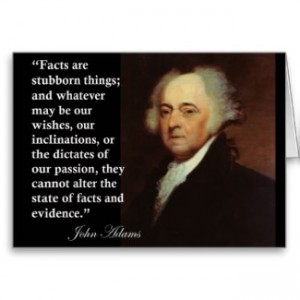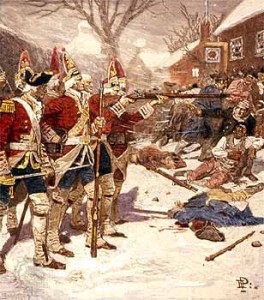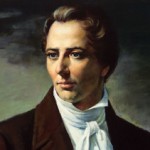posted by Writer on Aug 17
 Emotions ran just as high in Boston in 1770 as they are in Ferguson, Missouri today. But look what happens when men of Christian character are involved.
Emotions ran just as high in Boston in 1770 as they are in Ferguson, Missouri today. But look what happens when men of Christian character are involved.
This story begins on December 2, when a British soldier looking for part-time work gets into a fight. After getting his clock cleaned he returns with a few army buddies and the whole group gets beat-up this time.
Trouble continues through the weekend and comes to head on Monday evening March 5, as a soldier stands guard outside the customhouse. A few apprentice wigmakers started flinging insults at a British officer prompting the sentry to butt-stroke one of them with his Brown Bess.
A large mob, a number of whom carried clubs, surrounded the sentry. Some of the rabble-rousers (who later fought in the war) pelted the soldier with snowballs. Feeling threatned by the mob he fixed his bayonet on the end of his musket.
By now the crowd was throwing chunks of ice, prompting the sentry to yell for his comrades who were stationed across the street. Captain Thomas Preston responded first and called for a corporal and six grenadiers. Things were so confused at this point, with one account saying the city fire department was summoned to the scene.
Words and taunts continued as the crowd closed in on the Redcoats. Grenadier Hugh Montgomery was struck with a club thrown by one of the protestors and fell to the ground.
Once on his feet, Montgomery fired a shot into the crowd which caused the other soldiers to let loose (something I call the “monkey-see, monkey-do” syndrome). When it was over Cripus Attucks, James Caldwell, John Grey and seventeen-year-old Samuel Maverick were dead. The fifth man, Patrick Carr, died nine days later.
Order was eventually restored but Captain Preston and the eight soldiers involved were charged with murder and ordered held for trial.
John Adams and Josiah Quincy Jr. defended Captain Preston after no one else would take the case. After a week long trial that began in October, Preston was found not guilty because Adams’ had shown he was unarmed and no evidence was presented by the prosecution that he ordered his men to fire.
After a week long trial that began in October, Preston was found not guilty because Adams’ had shown he was unarmed and no evidence was presented by the prosecution that he ordered his men to fire.
That November the other soldiers were tried by the prosecution team made up of Samuel Quincy (Josiah’s older brother) and Robert Treat Paine. The same team that represented Preston defended the soldiers.
After eight days, six of the eight were found not guilty while two, Hugh Montgomery and Matthew Kilroy, were convicted on the lesser charge of manslaughter.
It had been shown that Kilroy shot and then plunged his bayonet into Samuel Grey, in part because he received the whipping from Grey back in March. He had also been heard to say that he had been waiting “to fire on the inhabitants”.
Adams later called this “one of the best pieces of service I ever rendered my country.” Saying, “Judgement of death against those soldiers would have been as foul a stain upon this country as the executions of the quakers or witches anciently.”
That’s how the rule of law works and if it breaks, the whole nation crumbles with it.
http://www.fofweb.com/History/MainPrintPage.aspiPin=LRJA01&DataType=AmericanHistory&WinType=Free
Note: Information for this blog came from the book, America Rebels by John Harris, pages 19-23, published by the Boston Globe in 1976. The link above was read on the Mark Levin Show, marklevin.com, 08-14-14 and can be found on the fofweb.com website.
Leave a Reply